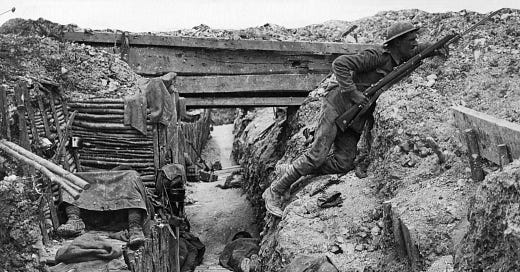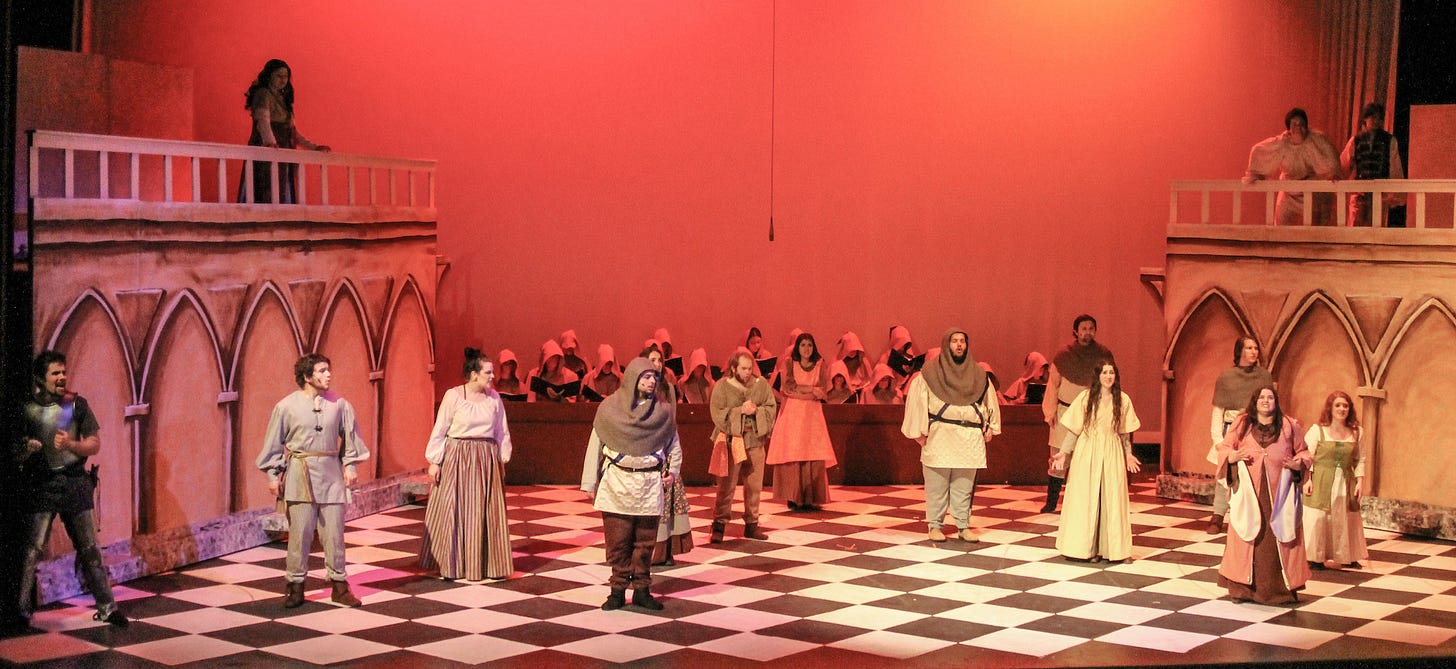Literature before war
My grandmother spent over a decade translating The Man Without Qualities from German into Dutch. Robert Musil, the author, took even longer to write it and died before finishing the third and last part. The novel is dense, philosophical literature set in pre-WWI Vienna as the Austro-Hungarian Empire was on the edge of its collapse.
The book follows Ulrich, a young man drifting through Vienna’s elite salons and dinner parties, observing their emptiness and contradictions. He’s drawn into the Parallel Campaign, a vague initiative to celebrate the empire’s 70th anniversary by uniting its diverse populations through art, science, and philosophy. It never amounts to much, only revealing the bureaucratic inefficiency, and the empire’s inability to confront its fractures or act in any meaningful way.
Musil satirizes political and social institutions obsessed with self-preservation, image, and empty rituals, over real change. And his critique captures the moral and intellectual paralysis of a hyper-rational society that is blind to its own decay. In the book, a disillusioned Ulrich floats through life, unable to commit to any moral or emotional framework. Musil shows how rationalism and technological progress, even though great for engineering and debate, fail to offer a moral compass, leaving people roaming freely and lost in an absurd world.
One of the book’s most famous ideas, “the sense of possibility” (Der Möglichkeitssinn), contrasts reality-thinking (focused on facts and what is) with possibility-thinking: an openness to what could be. Musil suggests that most people are trapped in reality-thinking, limited by pragmatic concerns, social norms, and existing structures. Which restrict their ability to envision meaningful alternatives. Ulrich personifies this struggle as he is caught in a suspended state between possibility and reality, aware of what could be but hesitant to commit to either concrete action or true visionary exploration.
I’ve tried many times to read the copies my grandmother gave me, but have to admit, I never made it to the end. Knowing that the book is meant to be “boring” didn’t make it any easier to get through the more than 1,300 pages. (A few of my friends have read it, and for some reason I quietly took credit for their efforts when telling my grandma, as if having friends who tackle dense Austrian literature at least counted for something…)
As the book slowly describes the rituals, habits, and conversations of Vienna’s elite, it meditates on big ideas about a society on the brink of collapse, and the unsettling strangeness of human behavior. Musil captures a world clinging to old certainties, as everything slowly starts to unravel.
His pre-war reflections on culture feel relevant to me today. There is this weird sense of slowness as I scroll through my feeds, looking at decadence and irony, alongside this pure urgency, all day, all the time. This neverending slow show of collapses all around.
Like Thomas Mann’s The Magic Mountain or Marcel Proust’s In Search of Lost Time, Musil’s work belongs to a broader tradition of famous pre-war literature. Books exposing the hypocrisy, blindness, and fragility of cultures on the edge. Trying to capture the spiritual crises, vanity, and empty social rituals with irony, and describing societies distracted by trivial blah blah, and blind to the political and existential forces about to overwhelm them.
*Cute hangouts out in the Salons…
Jeff Bezo’s wedding, cat pictures and murder
One thing that popped up in my feed recently (unsolicited, but that’s how feeds work these days...), was Jeff Bezos’s wedding in Venice. A rich display of performative extravagance. Leonardo DiCaprio, self-proclaimed environmental activist, the Kardashians, billionaires, actors, and socialites, all dressed to impress. The images kept showing up. Boats transporting guests between the different parties, while outside, activists threatened to put inflatable crocodiles in the canals, and anti-war protesters highlighted some guests’ ties to the arms industry, fueling and profiting from the current slaughter of communities around the world.
It felt like a bizarre display of self-delusion and moral emptiness, I read some comments that said “read the room”, as I slowly scrolled further to a mix of cat pictures and genocide.
(If feeds would be pages, I don’t know what page I’m on…)
Talking about absurdity.
These rituals of power, identity, and role-playing, with their choreographed dress codes and performances are exactly what mark these weird times, I suppose. Upholding an illusion of order and permanence, with instability and social tensions lying underneath.
The wedding in Venice with it’s beautiful costumes, echoed the same rituals described in pre-war literature. Elite ceremonies that reinforce group identity and connect participants to history and prestige. Amid growing inequality and social unrest, people seem extremely detached from reality. A showcase of this absurd contrast between wealth and the worlds surrounding struggles.
*Jeff Bezos dummy floating in the Venice waters, holding on to dollar bills.
Structures and destruction
Last week I read an essay in The Guardian, “The destruction of Palestine is breaking the world” by Moustafa Bayoumi (July 6, 2025). It’s a painful piece that describes how our international law is eroding under Israel’s military actions in Gaza, and the worlds failure to hold Israel accountable. How institutions like the UN and the International Criminal Court, structures we imagined would govern and protect us, turn out to be less solid than we thought.
The essay highlights how society’s rules, norms, and limits, things we assume are fixed, are actually quite fragile and always changeable. And most of the time, designed to protect dominant power interests (not to be Marxist about it…). It’s what Foucault coined “social constructs”: systems of power and knowledge that shape not only what we see as real, but also what we believe is possible.
And yet, even as these structures crumble, the performances go on. Jeff Bezos’ wedding being one of them, an extravagant display of wealth and permanence, staged as if nothing in the world is collapsing. But it’s theatre. Rituals meant to reassure others that the order still holds. It’s the dynamics that Musil captured when writing about those pre-war elites clinging to their empty rituals, distracted by empty chatter and sophistication.
“If there is a sense of reality, there must also be a sense of possibility,” he wrote. But our sense of possibility is shaped by what the theatres show us . When structures crack (like the failure of international law) what once seemed solid starts to shift, and the performances slowly get exposed.
Our accepted reality defines what we think is possible. But reality isn’t just “what is”; it is a shifting field molded by power, belief, and imagination. Limits are taught and enforced. But they can also be broken, sometimes violently (like now), sometimes subtly (also like now…). This fragility shows us how precarious our “orders” really are, while opening up space for new possibilities.
Seeing through the performance, we might stop playing our assigned roles so seriously and begin to realize that we can also rewrite the script. To imagine beyond the boundaries of power and tradition. This is a necessary act, not just for social change to be possible, but in order to navigate the absurdity and instability of our time.
* “The world is a stage, but the play is badly cast” (once well said by Oscar Wilde…)
I wish I could say that seeing through the theatre, and knowing that reality is a field much larger than we’re shown, something we can imagine and create beyond the show, would give me hope, or a sense of optimistic possibility at least. But I’m not sure it does…
Instead, I find myself researching waves of pre- and post-war literature, all describing the same sad human display of absurdity and paradox. And as I scroll through images of decadence and war on my screen, cat pictures, weddings and international politics, I feel a little numb, and less fiery than I’d like to be.
It reminds me of how I felt trying to get through those 1300 pages of Musil, no great plot twists, just watching human chatter play out against the backdrop of disaster: strangely calm, disappointed, and a little bored…
Literature after war
I wonder what post-war literature might emerge from these current and future wars (if there will be a world left to write in…).
Will there be new Camuses trying to make sense of it? Works asking: If the unthinkable has happened, then what?
Maybe there will be new books chronicling the cycle we seem so doomed to repeat: exploring the paradox of life and death, peace and war, good and bad, and how they are inseparable. I hope so. And I hope they manage to weave in a decent plot, and a little irony at least, some theatre, since we seem to love it so, even in the face of the most unimaginable horrors.







Your writing is always so intelligent, enlighting and wonderfully written and significant. Thank you!
Very well articulated regarding Bezos' Venice wedding. It was so absurd, I truly hope this is yet another signal that we're drawing to an end of an absurd era. It wouldn't be a second too soon.